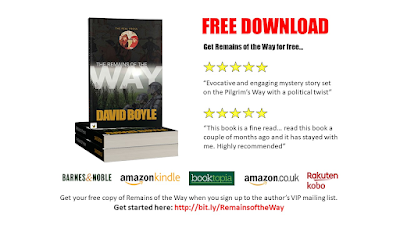David Boyle's Blog, page 4
December 7, 2021
The metaphysics of covid-19

This post first appeared on the Radix UK blog...
This may seem a peculiar post to write on a thinktank blog, yet writing it is a result of my sense that beliefs are at least as important as Mckinsey-style measurement. They certainly are in the world outside the hothouse we know as the Westminster ‘bubble’.
Why, after all, is a good quarter to a third of the adult population of continental Europe so keen to avoid vaccination? Because of the fundamental beliefs they hold about covid that frame their responses.
The real issue about the disaster that has hit the world is not so much about statistics anyway - but about what we believe about it. Not so much about precisely who caused it, but about its true significance.
And here we find ourselves in a largely evidence-free zone. What I can say is that the real issue around covid is what it is for – and therefore why it has arrived.
There will certainly be positivists out there who think these kind of questions have no meaning because they are unverifiable. They are certainly unverifiable now, but they derive their meaning from being able to verify them one day – either individually after we die or sometime before that.
The real leap I take here is to introduce the Jungian idea of a collective unconscious into a policy discussion. Though I am aware that,by introducing a past and a future, I'm already straying some way from Jung's original idea.
it possible, in other words, for our own human futures and our combined human pasts have been wrestling with ways to draw humanity into a safer space?
Are there ways in which humanity can survive the combination of crises before us?
I don’t know, but our future selves do know and I believe covid was a way to bring us to that safer space.
Remember that covid-19 has been a virus that targeted the old and infirm. It has not targeted children, nor young, fit and healthy people like the flu epidemic of a century ago. And believe me – I lost my wonderful mum to covid – so I understand that these are not losses that are miraculously pain-free.
I was involved last year in writing some background materials for three short films, made via the New Weather thinktank about the enormous benefits of covid – as well as the obvious difficulties it has brought in its wake.
Maybe it was a kind of minimum viable package capable of nudging humanity in the right direction - of survival. You can see the almost miraculous lessons learned within days of the first lockdown and since, in the UK, that local people working together can achieve a great deal more than centralised or corporate diktat.
It showed us that we can look after homeless people if we want to. It encouraged people to get back on a bike.
The issue is whether we can learn the lessons, about flying in particular. The most obvious is the lesson about sharing vaccines. It seems obvious to me that we will have more panics like the one we are now having about the omicron variant, and while we queue in the cold drizzle – as I did last week – to get my third dose, there are so many other people around the world who need a first one.
Until we can think in a little more human ways, we may be doomed just to repeat this over and over again.
So, what is it that you believe about covid?

November 15, 2021
Are we approaching the next wave of community innovation?

This post first appeared on the Radix UK blog...
I have been very interested to see the slow return of a broader consciousness of history, after it has driven out by a combination of modernism and economism. I would like to think that my own, very tentative timeline for a history of community development since 1940, published over the summer by the Local Trust, has helped a little.
Either way, last week, I found myself at a fascinating online conference in the Spaces of Hope: People's Plans programme – and was wondering, gently to myself, about why so much of what has happened before, and how much has been achieved – by the Eldonians in Liverpool, the Glasgow housing co-ops or in Coin Street on London’s South Bank – has been so quickly forgotten.
Whose fault was it that recent governments have shown so little interest in community-driven, bottom-up regeneration?
Traditionally, most of us have blamed the political right, and it was true that the Thatcher government was not very interested in sharing power with impoverished communities.
But I have a feeling that the conventional Left needs now take an equal part of the blame – given that they are all so nervous about appearing populist or Trumpist, that we are not supposed, any more, to doubt what the ‘experts’ say – or state officials – when most community development has to start precisely with that kind of scepticism.
Somehow we need to remember that people and communities have some reason for scepticism about conventional regeneration – that somehow all we need to do is to persuade cities to specialise and the build motorways and IT superhighways, and – hey presto!
Unfortunately, most cities specialise in precisely the same sectors, none of which – however hopefully we may train the locals – are likely to employ most of those who need it.
It could therefore be the political Right which takes the necessary leap of imagination. That is what I wondered when Michael Gove, of all people, launched a report at his party conference called Trusting the People, published by the New Local thinktank and the New Social Covenant Unit and written partly by Danny Kruger, Gove’s new parliamentary aide, and other Red Wall MPs.
It is interesting because it talks about the next stage of Conservatism which is to “to put power and trust into the hands of the British people”.
Gove has been assumed to be backing these principles for his own version of planning reform. Needless to say, the Tory ‘free market’ thinktanks – Adam Smith, IEA and Cato – are not too happy about it.
Here is the argument, it seems to me. Almost nobody wants to go back to the pre-1970 age of building upwards by targets, launched by Harold Macmillan as housing minister, which led directly to a new generation of slums and to the collapse of Ronan Point in 1968.
But equally, it seems to me that the Thatcherite approach by Howe and Lawson to let the market decide clearly hasn’t worked either. It has raised land and property prices to disastrous levels.
For some reason the entire political establishment believes this is because we have ignored ‘price signals’ which imply a shortage of homes. But nobody has persuaded me how one can ever supply enough housing to satisfy the demand, for example, for Far Eastern investors who want to buy into the London property market.
It isn’t too few houses driving up property prices – it has been the over-supply of mortgage finance seeking too few houses. It is classic inflation, in fact. Subsidising mortgages can only make this worse.
The government, to give them their due, does appear to be beginning to grasp some of this. So what do you do instead? The pamphlet doesn’t say, though it does mention briefly that neighbourhood planning should be “universal and the ultimate arbiter of local development”.
This is how it ends, calling for Conservatives to “come together to clear the political pathway to enable power to flow through to the people”.
“Community-powered Conservatism is the only credible approach which promises to improve our quality of life, strengthen our economy and unite our nation. This is a Conservative project for the next decade and builds upon our greatest asset, the people of the United Kingdom.”
I have only one and a half problems with this rhetoric, which otherwise I would be out there cheering on. The half problem is that, personally, I don’t like appeals to ‘The People’. That smacks a little too much of Alec Douglas-Hume taking us for granted (“The British people are prepared if necessary to be blown to atomic dust”).
Trusting people seems to me to be a civilised, practical way forwards; trusting The People smacks a little of centralised Stalinism.
The other worry I have is remembering some of the Big Society rhetoric from a decade ago. The language was all there, but I remember meeting those most associated with the idea shortly after the new coalition took office in 2010 and finding my brain completely addled by how shallow it all was.
So, my question is this. If Gove really lets communities decide on planning applications, and they decide ‘wrong’ according to the government – how will he resist the huge pressure on him to bring in safeguards to prevent it? So is the Conservative Party is really ready to let go of central power?
I feel sure they will be eventually – because, in a democracy, people get what they want. But local people will need some protection to get involved in local planning, and then – how do you stop the usual rot setting in?
October 26, 2021
We need a new kind of national plan
 This post first appeared on the RadixUK blog.
This post first appeared on the RadixUK blog.
Things fall apart,” wrote Yeats in 1919, during the flu epidemic, “the centre cannot hold…”
The best certainly lack all conviction, while the worst/Are also full of passionate intensity. It is a scary time,
The problem for any government, not just one determined that we should still be living in around 1986, is that it has to be obvious to most of us that most of their quick fixes fix nothing. Continental lorry drivers don’t want to work here – who could possibly have guessed it, and when we have been so welcoming before…!
The next few weeks – I predict – will see a deepening of the staffing crisis in the care sector. There may be some more bankruptcies among the smaller gas providers too – these are all symptoms of having a covid crisis on top of an energy and staffing crisis.
In recent weeks, I have made a number of strategic suggestions about how to tackle the fundamental issues without making matters worse – from developing a paleo economics plan for devolving economic power to major anti-trust action to break up the monopolistic companies that purport to serve us.
But what we really need is some kind of national plan, which can unite us and show us what we might do to help drag ourselves back from poverty, and to help save the planet at the same time.
I don’t mean the kind of centralised targets in Stalin’s five-year plans, I mean something like Max Nicholson’s ‘National Plan for Britain’ of 1931 (and thanks to Ruth Potts for writing about this on the 80th anniversary; it is now past the 90th).
Nicholson was one of the founders of the green movement – he died in 2003 aged 98 and was one of those who launched the WWF with Peter Scott and the Duke of Edinburgh. But as a young man, as assistant editor of the Week-end Review, he drafted a special issue including ‘A National Plan’.
This was February 1931. Within months, the UK government had collapsed under the weight of post-war austerity, a National government had been formed, led initially by the Labour leader Ramsay MacDonald, the navy mutinied at Invergordon (September) and, by the end of the year, work on the liner Queen Mary was stopped on the Clyde.
It was a tough time, and the conventional activities by Labour and Conservative politicians alike failed to work. Roosevelt was still a year away in the USA, Oswald Mosley resigned from Labour two weeks after the Plan was published and formed the New Party in the UK.
The National Plan was important partly because of what it led to – the first thinktank, Political and Economic Planning (PEP), now the PSI. It was formed at a series of meetings at the Ivy restaurant in London – with people like Israel Sieff from Marks & Spencer, Nicholson himself and the Huxley brothers Julian and Aldous.
In retrospect, I am not sure whether we would approach a national plan in the same way. It was far too technocratic. In fact, Aldous Huxley never showed up again, and spent his time writing Brave New World in reaction to it. I tell the strange story of the start of PEP as part of my history of M&S in my book with Andrew Simms, Eminent Corporations.
We need to find a way that we can return responsibility to local people and get all the sectors on board – to show how to build an economy that can save the planet and save our lives at the same time, and how the moving parts might fit together.
http://bit.ly/RemainsoftheWay ...

September 29, 2021
WTF is going on??

This post first appeared on the Radix UK blog...
“Nobody in politics seems to know what the real problems are, let alone how to fix them. The government lurches from one ‘fix’ to another, and seems to think that the public finances can be repaired by taxing employees and employers alone, with no additional taxation on wealth. Mr Starmer seems to think that following what Tony Blair did makes sense.” Tim Morgan, Surplus Energy Economics
What on earth is happening? Not only are we reeling from Brexit and the aftermath of a pandemic, but something else appears to be going on too. So we have panic buying of fuel and shortages of medicines and probably food as well.
Both sides of the Brexit ‘debate’ appear to be blaming each other for this, which hardly helps matters. But since similar shortages are also happening across the USA, we have to assume that this is actually about other influences too – extreme monopolies creating shortages in order to raise prices.
To put that in UK terms, we might call it ‘economic centralisation’. This is what happens when governments have allowed the UK market to be dominated by only two companies making carbon dioxide for the food industry – both of them foreign owned.
Put like that, small CAMRA beer makers and small publishers (like the Real Press) – or, to mention Sarah’s company – small dye studios like Sarah Burns Patterns, may be part of an eventual resurgence.
But not yet. The truth is that, just as Tim Morgan has suggested for some time, the number of fixes we have imposed on our struggling, debt-ridden economy in the past two decades, are finally now catching up with us.
This kind of crisis tends to happen every four decades. But when it has happened before – in the late 70s or the late 30s or the turn if the century between the 1890s and 1900s – we knew that what should happen next. This time, we have managed to suppress economic debate, so we seem to have new idea.
Reading the Sunday Telegraph last weekend, you can see the cracks in English conservatism emerging – between those hopeless remerging climate change sceptics complaining about the price of energy, and the letters complaining about why on earth we are still building homes without solar panels.
I know which side I am on – on the radical side that looks much further back for their solutions. It seems to me that most of our current difficulties stem from the Thatcher-Reagan period in the 1980s – and the really stupid idea that monopolies somehow don’t matter.
But I know that Tim Morgan’s analysis goes deeper, suggesting that we have reached a period when it now takes more energy to generate energy – leading to his predictions of serious economic problems and resulting peculiar political results too.
What we desperately need is leaders who understand the sheer complexity of the new world. We unfortunately have a prime minister who believes it has something to do with games people play at Eton.
We have run out of tricks and fixes. We need the kind of clear-out of the political classes that happened after Dunkirk in 1940: it is time, in fact, for the politics and economics of national survival.
But nobody is even setting out their stall about what that might mean in practise yet. Some voices who might do that: Michael Gove, Lisa Nandy, Daisy Cooper – let’s hear from the next generation…
http://bit.ly/RemainsoftheWay ...

September 13, 2021
We need to experiment with paleo economies

This post first appeared in the Radix UK blog...
In case anyone is at all interested, I have begun a peculiarly fearsome diet called the Wahls Paleo Plus - which involves eating very little except for meat, fish and vegetables, also minimising carbohydrates like potatoes.
I’m doing it because I am convinced it will bring back some of my missing voice, which has been slowly dwindling since I was working at the heart of government in 2012, and is now largely AWOL.
The point about this blog, though, is to unpack some of the ideas behind paleo. For one thing, I don’t know how to pronounce it - which is odd given that it is short for ‘paleolithic’, a term coined by my great great grandfather, Sir John Lubbock, in his 1865 bestseller Prehistoric Times.
Given that, there's no suggestion that we need to go back to paleolithic times, or even neolithic ones. Just that if we can organise a simpler diet based on what human beings ate in a more natural state, then health begins to sort itself out. This is what one healthy eating website says:
“The Wahls diet is a type of paleo diet. The key difference? The Wahls diet tells followers exactly how much of a certain food to eat, namely vegetables and protein. The protocol specifies that followers eat six to nine cups of non-starchy vegetables a day and four ounces of protein (fish, specifically twice a week). Plus, it has a specific focus on veggies, which Dr. Wahl posits gives the mitochondria the power it needs to convert food to energy, healing the body in the process.”
Dr Wahl herself seems to have rowed back the symptoms of MS using this diet, which of course puts her on the opposite side as the technocratic medical establishment.
Now, I have been wondering whether escaping tickbox technocracy might involve thinking about what a paleo economy would look like.
Like a paleo diet, this might not mean going back to a pre-monetary barter or gift economy as set out by Marshall Sahlins in Stone Age Economics.
Sahlins, who died in April, said that hunter-gatherer societies are able to achieve affluence by desiring little and meeting those needs/desires with what is available to them. This he calls the "Zen road to affluence, which states that human material wants are finite and few, and technical means unchanging but on the whole adequate."
It may be that, to reach this better kind of zen, we need to go back to a period before the 1870s in England, when most communities had access to their own food and processing, plus locally-owned newspapers, breweries, slaughter houses and banks - and I now believe that these four are crucial to making local economies work.
Of course, by the1870s, it was too late for so many of our heaving cities. It might be sensible to go back to the kind of economies people lived in during the twelfth century, when there was very little poverty, at least in England.
I have written about medieval economics before. The real question here, as it is with paleo diets in fact, is how we get from here to there. I certainly don’t want to encourage the kind of puritanism that might lead us collectively towards both.
It is also worth remembering that neither will be permanent, but both involve a great reset. What unnerves me is how much our existing legal frameworks frustrate either task. In economics, they currently encourage scale, monopoly and dehumanising size.
About the diet: watch this space...
http://bit.ly/RemainsoftheWay ...
August 10, 2021
Could we learn about the future shape of the UK from King Caractacus?

This post first appeared on the Radix UK blog...
About ten years ago, I was talking to someone from The-Pub-Is-The-Hub – Prince Charles’ outfit for advising community pubs. They told me how the best economic unit for a community pub to survive economically wasn’t 10,000 people in the catchment area or even 2,000. It was 500.
That was a revelation to me, and the beginning of a fascinating search for other examples when smaller units survive better economically than bigger ones.
Maybe some hint of that was also why Private Eye editor Ian Hislop has been presenting a BBC radio series about the lost kingdoms of England, like Anglia, Mercia and Wessex and so on.
I have been wondering myself about the significance of such ancient history. After all, why has the BBC commissioned Hislop now?
Perhaps because there is a deep sense that our units are now too big to be effective – and because the idea of small nations across Europe, introduced in our own age by Freddie Heineken, is beginning to work away at our imaginations.
That is in fact one of the reasons why I wrote my series of novels about Caractacus (the third part, Roman Briton, is now out) – though these are earlier nations: Celtic ones and rather smaller than those Saxon behemoths.
In fact, there were three reasons why I began researching Caractacus – party because I read about his lost autobiography which might have explained how he held back the Roman invaders for nine years (this was a misunderstanding on my part: it was probably never been written).
It was partly because the idea appealed to me of Caractacus being a Christian king facing down the pagan Romans (who just happened to have arrived a little after Joseph of Arimathea came to our shores between 3-5 years earlier).
But partly also because I wanted to re-imagine Britain as a group of semi-independent nations under a high king.
Because we only have Roman sources, we normally think of the Iceni, Brigantes or the Silures as barbaric tribes.
They may have been that of course, but they may also have been something a good deal more civilised – nations like Icenia (under King Prasutagus and Queen Boudicca, covering Norfolk and Suffolk), or Brigantia (under Queen Cartimandua, covering Yorkshire), or Siluria (under King Arviragus and covering south Wales and Somerset. And held together by loyalty – or lack of it – to a high king.
Rehearsing a list like this is even more of a reminder how much classical scholars cloud our view of our own history. These are all Romanised names – we know that Caractacus was originally Caradoc, but recovering the rest demands an informed but imaginative approach to linguistics.
The days of high kings may now be gone, but Brexit does at least give us an opportunity to think about the structure of our nation, the right scale to be most effective and where our natural boundaries actually lie.
Maybe, if we can sort out the old logical issues about UK devolution – which used to be called the West Lothian question – then the idea that, in the almost legendary history of our home, we used to live in small semi-independent nations. So we could again: not just Scotland or England but maybe home rule for London or Sussex or Dumnonia.
Either way, it can be fun thinking about a far more localised structure for Britain that might actually be a futuristic vision of nations that might provide a template for other parts of the world.
http://bit.ly/RemainsoftheWay ...

July 31, 2021
Why I am taking Southern Rail to court...
 This post first appeared on the Radix UK blog.
This post first appeared on the Radix UK blog.
It was fascinating to see the interview in the Observer with David Brown last weekend, about the Go-Ahead group where he has been CEO for the past ten years – including the GTR railway that I have been writing about in various places for the past five years.
It was also a little strange that no mention was made of the court case against his company for unlawfully restricting travel, in contradiction of the legal fare-setting regulations.
Who is taking them to court? Well actually it is a little complicated, but theoretically at least – it’s me…
What? Me? It sounds a little strange to say so, but – along with my fellow rail passenger advocate Eddie Vermeer – yes, I am taking GTR to court. I am doing so on behalf of those fellow passengers who I got to know when the Southern rail network came close to catastrophic failure in 2016 and 2017.
And many others too – probably over a million of them in fact.
Here is the problem. GTR is a franchise with three brands that operate on the main line between Brighton and London – Thameslink, Southern and Gatwick Express. The fare-setting regulations give passengers a legal right to buy a ticket which is valid for all three brands. But GTR restrict this by selling seeking tickets which are restricted by brand (Southern only). They then sell the passengers’ rights back to them, either partly (not Gatwick Express) or fully (any permitted).
I use the station at Shoreham-by-Sea, so this only affects me when I miss the train, or when GTR cancels it, and I have to rush via Brighton. But for those commuting from there, there is a daily decision to be made – do they pay the extra to go on the Gatwick Express or do they risk finding a GTR train waiting for them on the platform but not being allowed to travel on it?
I have had to waive my rights to compensation to be involved in bringing this class action – which is quite right.
Those who know me well will know that, for me, this also takes the story full circle – back to the problems of monopoly power which originally got me involved in writing about the Southern network in the first place.
So wish us luck! And watch this space…
http://bit.ly/RemainsoftheWay ...

July 15, 2021
Being English: Nelson, Wellington - and Gareth Southgate
 This post first appeared on the Radix UK blog...
This post first appeared on the Radix UK blog...
Like about half the UK population, I watched the football on the telly and went through the same mixture of emotions as everyone else who was watching. So let us just remind ourselves what they were – disappointment and also pride.
What I particularly felt proud about – though it is unfashionable and probably horribly politically incorrect to say so – is being English. Thanks to the restrained calmness of Kane and Southgate.
Of course, that was before the news about the violence and the muggings. In Sussex, most of the taxi drivers simply abandoned the scenes of insanity and went home.
I used to have a theory about our national personality – based on the single antagonistic meeting between Nelson and Wellington, in the lobby of 10 Downing Street (I wrote more about this in my book How to be English).
My feeling was that Wellington invented a new kind of personality for the British – clipped, laconic and unemotional. His despatch about the Battle of Waterloo was so uncommitted that the American ambassador reported home that he must have lost. That was also the personality we were brought up with.
Nelson represented the older, English version – sentimental, over-indulgent, and determined. And yet calm too.
It seems to me that we have now reverted to the original, and that isn’t always very pretty.
But most of all, I have been proud of Gareth Southgate’s obvious leadership abilities. He is one of a handful of people who speak in public in an entirely unfamiliar tone – who seem to make it possible for us all to be better people.
Another one was Cressida Dick, the Metropolitan Police commissioner. Neither of them are infallible, but they take responsibility for their mistakes and they explain how brilliant people can be. In fact, Cressida Dick was – as I wrote at the time – single-handedly responsible for the change in mood during the 2017 general election by emphasising the individual courage of passers-by during the terrorist attack then, rather than banging on endlessly about revenge and vulnerability.
Now I fully recognise that we have a problem in the UK with football violence and online racism. But I wish politicians could find it in their hearts to talk up the English capacity for heroism and calm sometimes.
It seems to me that most political rhetoric coming out of Number 10 at the moment appeals to our worst sides, not our best – especially now, as we head towards the Great Experiment by Boris Johnson: opening up everything just when our infection rate is now higher than Pakistan’s. It is the quintessential definition of Toryism by Gladstone: distrust of the people, tempered by fear - possibly the other way around.
http://bit.ly/RemainsoftheWay ...

June 27, 2021
So that nuance and complexity shall not perish from the earth
It is one of the great ironies of history that, east and west, the liberation of the agricultural slaves and serfs – the people who carried out most of the work in the fields of Russia and eastern Europe and the plantations of the southern US states – happened almost simultaneously.
The slaves were freed by the Emancipation Declaration of Abraham Lincoln in January 1863, though it required another two years to win the Civil War and finish the job. But the Russian serfs were freed from bondage to the land at almost the very same time. The declaration was in March 1861, to cheers outside the royal palace in St Petersburg, but it also took two years and came to fruition in February 1863, just five weeks after Lincoln promulgated his Emancipation Proclamation.
Both liberations were great victories for the anti-slavery campaigners, more than half a century since the first successes of the campaign against the slave trade. But they were also great disappointments for agrarian radicals. Because, in both cases, the slaves and the serfs were catapulted from bondage into poverty.
In the USA, slavery was replaced by peonage and debt bondage. In Russia, the land was valued at three and a half times its market value, and this the impoverished serfs had to pay their former owners over a period of 49 years. For many serfs, even the details of the terms were not agreed for decades. Just as the former slaves had been in the USA, many of the serfs were thrown on the mercies of the money lenders.
In short, it wasn’t enough to release the slaves – you had to release them from debt and monopoly and the economic tyranny that replaced it.
The trouble with the current ‘debate’ about slavery is that it tends towards the puritanical tickbox – historical figures are either linked to slavery or they weren’t. Simples.
The economic follow-up to slavery adds a new dimension that you don’t hear so often. Should we condemn the money-lenders in the same way or not? Might there not have been some responses to the problem as reprehensible as the great evil of slavery?
And by the same token, how about someone who was kinder to the slaves he had inherited – was he equally deserving of condemnation or not?
The same goes for British imperialists. Were they all people who should have their statues removed? How about John Hare, the last recruit into the Colonial Administrative Service in Northern Nigeria – whose book L ast Man In , tells the fascinating story of a man who tried to do his best for people at an uncertain moment in history?
This is, in short, a tentative plea for nuance when we start condemning people for their involvement, either in history but also those who are involved in modern debate about these issues.
I hope I have some support in this opinion from the Nigerian novelist Chimamamda Ngozi Adichie – admittedly she was writing about gender not slavery (and I have promised colleagues never to blog on that subject). She can say things as a black woman that I can’t, so let me just quote her:
“We have a generation of young people on social media so terrified of having the wrong opinions that they have robbed themselves of the opportunity to think and to learn and to grow. I have spoken to young people who tell me they are terrified to tweet anything, that they read and reread their tweets because they fear they will be attacked by their own. The assumption of good faith is dead. What matters is not goodness but the appearance of goodness. We are no longer human beings. We are now angels jostling to out-angel one another. God help us. It is obscene.”
Which is why all I suggest is that this is a debate that needs more nuance and complexity. Ask a question, says Adichie, and “you are told the answer is to repeat a mantra”.
It is true that young people have always lacked a little in the nuance department. They have always been iconoclastic.
So why is the corporate world adopting positions in cancel culture, as if they were youthful? That is what worries me. It isn’t so much the students that make me nervous – it’s the grown-ups. So when corporates start refusing to touch people who might offend others, on the basis of a tickbox either/or, then we all need to be a little scared.
http://bit.ly/RemainsoftheWay ...

May 15, 2021
The cynical miserablism of the left, and why it can't win yet

This post was first published on the Radix UK blog
My brother-in-law appears to be becoming some kind of bellwether of British electoral politics – he has voted at least four ways to my certain knowledge in recent years, since retiring as a headteacher. And – to my great surprise – this time he voted enthusiastically for Johnson.
Why? Because, as far as I can see, it would be one in the eye for the media for complaining endlessly about who paid for the famous Boris curtains.
This is of course one of many explanations flying around the press about why the Conservative government should have performed so well, after plunging us into covid, lockdowns, test and trace and so on.
I have three thoughts on this.
First, there remains a real question mark over the usefulness of the Labour Party in its current form, given that is remains constructed as a tool to support the industrial classes, when there are so few of them around. It still smacks of those mighty acronyms of my youth – TGWU and CEGB. We are all generating energy these days, just as we are al mix-and-matching our TV habits. The days when we all watched the same TV programmes have long gone (until 1980 perhaps, with the launch of the fourth TV channel).
Second, I have been wondering whether my brother-in-law is right that – at least by implication – the opposition politicians have found themselves entangled in the minds of voters with a preachy, intrusive and alien media. They feel, perhaps, that – when they get bored of Boris – they will kick him out themselves. When they are good and ready.
Finally, I believe G. K. Chesterton was onto something a century ago, when he talked about the “tone of bitterness [and] atmosphere of hopelessness” encouraged among socialists, explaining why he became a Liberal instead. That is even truer now than it was then.
It is hard to see how we a can arrange a government of the left that is able to put aside the judgemental, puritanical, knowing and pessimistic. The left parties that win, if they ever emerge to do so, will be positive about people and communities. The cynicism and miserablism of the left is deeply offputting, whatever their detailed policies might be.
And unfortunately, when the Lib Dems run out of their own ideas – as they appear to be doing – they get suffused and infected by the same disease. Since the first Liberal embraced the first Fabian idea – circa 1890 – they have developed the same kind of snobbery, not far below the surface.
Because that is what it is. Nor is the way out of this, as those around Starmer seem to think, about wrapping ourselves in the union jack. We have to believe in ourselves as Irish, Scots, Welsh and – yes – definitely English people too. And in our neighbours – not glancing nervously at them as possible racists or the descendants of racists – and remembering Gladstone’s definition of Liberalism, as “trust in the people, tempered by prudence” (as opposed to Toryism “distrust of the people, tempered by fear”).
And knowing that, if we can do that, we cam be great nation, and a moral one too.
This isn’t the pseudo greatness that comes from carrying a big stick – those days have gone too. It is soft power from the ubiquity of English language and culture.
We may anyway have to update the union flag too, assuming that our current government appears to be on the verge of losing Scotland.
I have always felt, rather as George Monbiot did last week, that the Lib Dems in Scotland have found themselves on the wrong side of this debate – until Nick Clegg declared the party were ‘unionists’ that was never what the Liberal Party was. Nor were they nationalists, of course. They were in favour in Ireland of home rule under a united umbrella.
If Johnson persists in his Napoleonic attitudes to Scotland, the comparison with Ireland in the 1920s will become increasingly worrying – on the verge of bitter civil war that would echo into our own day.
How do we stop this? There is only one way. Finally to sort those ridiculous constitutional compromises that have caused us so much difficulty – launching a proper parliament for England in Oxford or Manchester.
The settlement would allow, the four nations of the UK, to go their separate ways but to hold them together under the Council of the Isles, or similar, with the queen and the common currency, the foreign office and a defence umbrella. Still run out of a cut down Westminster (London might also be a sovereign nation too).
Perhaps in the fullness of time, we might even get the Irish republic to join as an associate. Scotland would be free to join the EU if it wanted to, and we would need to find a democratic and borderless way to govern the old UK.
To others on the left who suggest that England would then be doomed to have a Tory majority forever, I would direct them towards Matthew Parris in the Times last week (£), who suggests that there is a limit to how long we will all accept one-party rule.
I think he is right. If we can somehow generate an optimistic alternative.
http://bit.ly/RemainsoftheWay ...

David Boyle's Blog
- David Boyle's profile
- 53 followers



